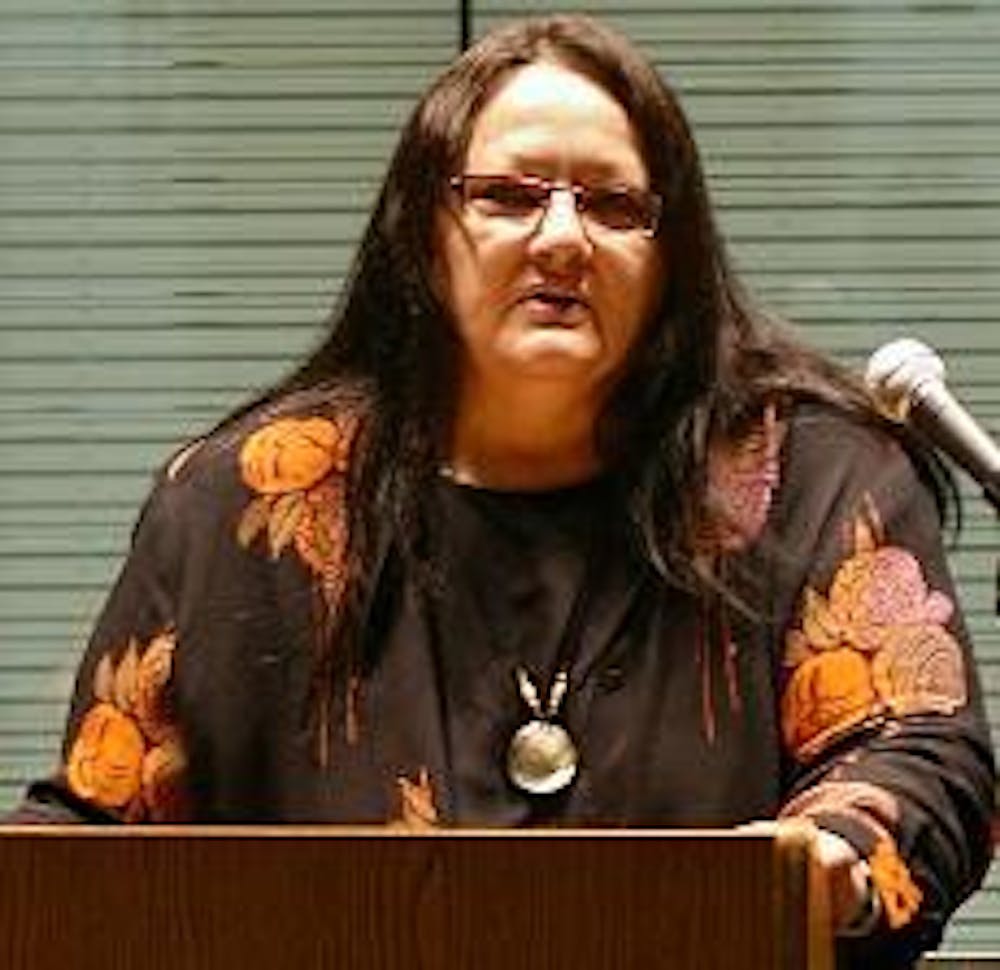Suzan Shown Harjo, a Native American activist, said she is opposed to references of Native peoples as sports figures, and references to natives in sports need to be eradicated to provide some sort of dignity to Native American society.
"We have very little way of confronting [sports teams and their mascots] because it is so intermingled in what people think is their right," said Harjo, who spoke to about 20 students gathered last night in Battelle-Tompkins.
Harjo is one of seven native people who filed Harjo et al v. Pro Football Inc. in 1992. The lawsuit regards the name of the D.C. pro-football team the Redskins before the U.S. Patent and Trademark Board. In 1999, a three-judge panel unanimously ruled to cancel federal patents for team names because it "may disparage Native Americans and may bring them into contempt or disrepute." The case is now awaiting trial before the U.S. Court of Appeals after it was appealed and overturned by the District Court.
The case was not taken seriously at first, and Jack Kent Cooke, the team's owner, thought it would be quietly settled out of court, Harjo said.
Times change, and the modern era must make up for past faults, she said.
"All we have to do is show times and sensibilities have changed since these names have cropped up," Harjo said.
Harjo's speech kicked off American Indian Heritage Month. Student Advocates for Native Communities will host events throughout the month to raise awareness of various issues.
SANC's mission is to "educate the AU community through cultural exploration about American Indian culture, history and issues and to address policy that affects natives," according to a pamphlet distributed at the event.
The agenda where activists have been most successful is getting rid of Native American references in sports. However, all gains have been in educational sports, not pro sports, Harjo said. In school sports, the mascot can be repealed because there is a part of the student body that can be harmed.
"If there is something that can be avoided that's negative, then it's good to do it," she said. "Pro sports is a different story - it's all about money."
Harjo said she and other activists tried to meet with the owner of the Washington Redskins in the late 1980s, but he would not meet with them. Through a reporter, the owner said the name would not be changed because it costs too much money and the mascot is not offensive, according to Harjo.
"It is up to the offended class to state the nature of the offense and find it derogatory," she said.
Harjo said some of those symbols are kept because of history and racism.
"Almost no one knows who native peoples are," Harjo said. "One of the reasons [is] because there are so many stereotypes."
In 1970 there were over 3,000 teams with Native American mascots and today there are just over 900, according to Harjo.
"I look back on the past 36 years and say that didn't take that long," she said.
Harjo said they have stopped hundreds of derogatory names from passing the U.S. trademark through petitioning.
Alan Yu, a freshman in the School of International Service, said he went to the event to hear what Harjo had to say about contemporary Native Americans.
"I found it very informative to me as an international student who has only learned about mainstream American history," Yu said.
Carrie Johnson, president of Student Advocates for the Native Community, said it is an important issue people need to think about.
"Mrs. Harjo's speech showed the problems in society that it is still socially acceptable to be racist towards native peoples," Johnson said. "She definitely pointed out what needs to be done and has shown the AU community about American Indian culture, history and issues to make a more informed AU community."
Jacqueline Santos, a freshman in the College of Arts and Sciences, said she enjoyed having a speaker she could relate to.
"I was really excited we had a Native American guest speaker," she said. "Especially the topic because even though I had gone to an all Native American boarding school, I like that I was able to get a new perspective on an idea that I thought I knew about. It feels good to hear about Native American issues and to be able to relate to them where normally at AU the issues are harder to relate to."
Other events are taking place for American Indian Heritage Month place in November, such as a harvest festival in TDR Nov. 9 and a Nov. 28 craft sale.





